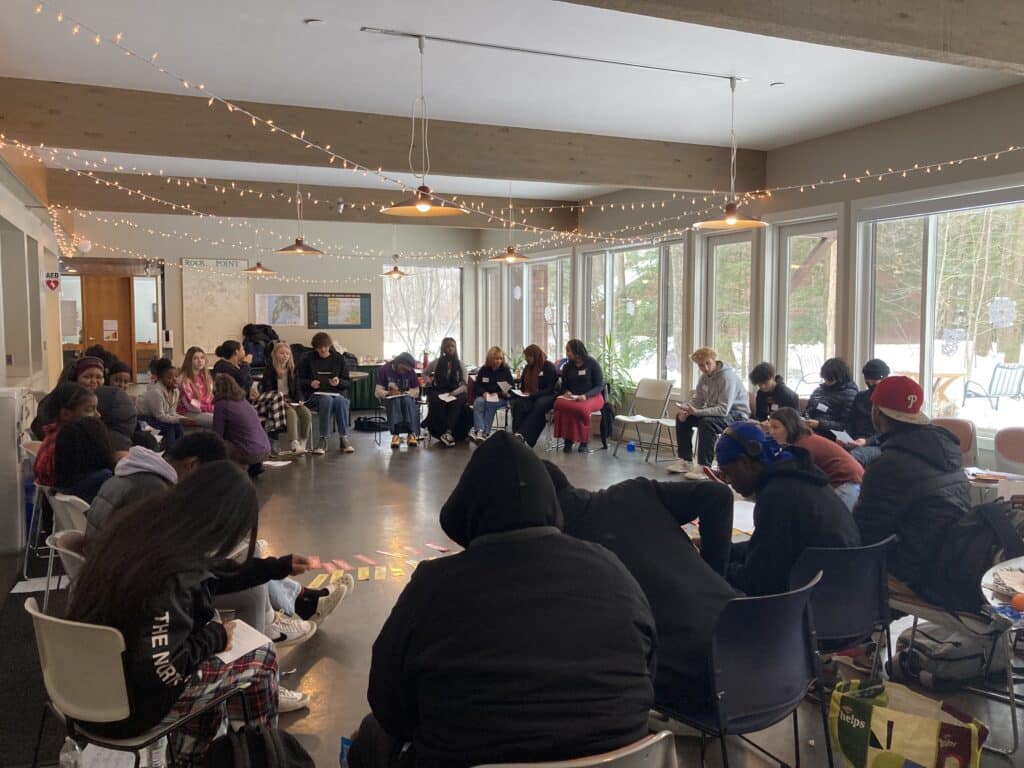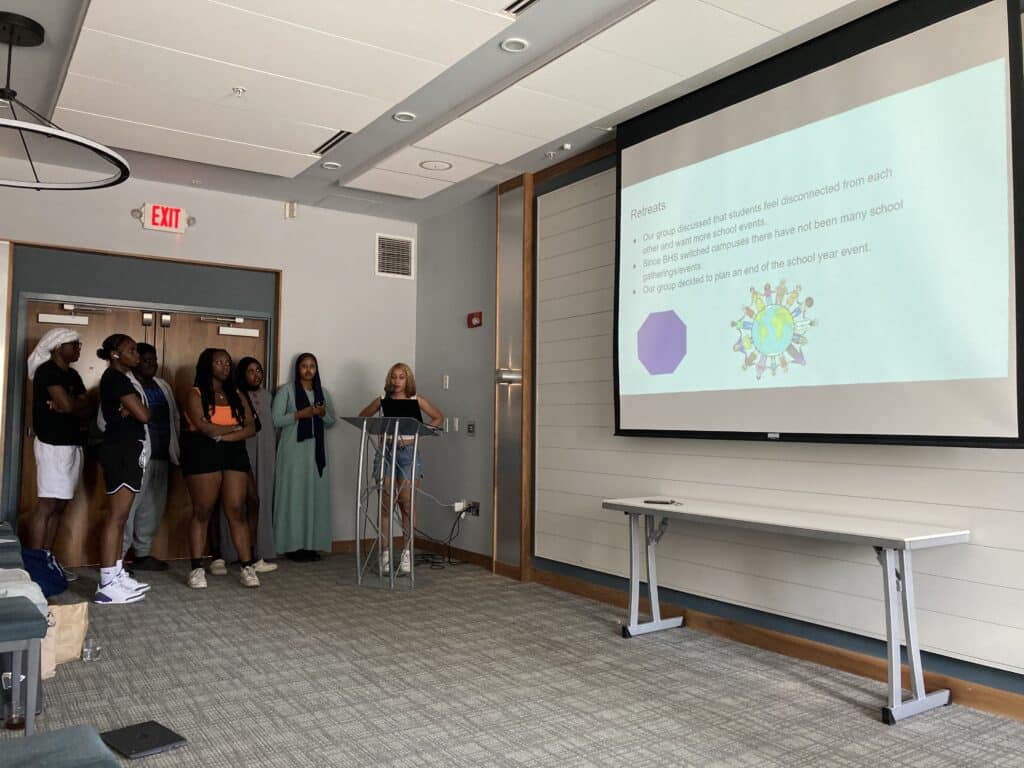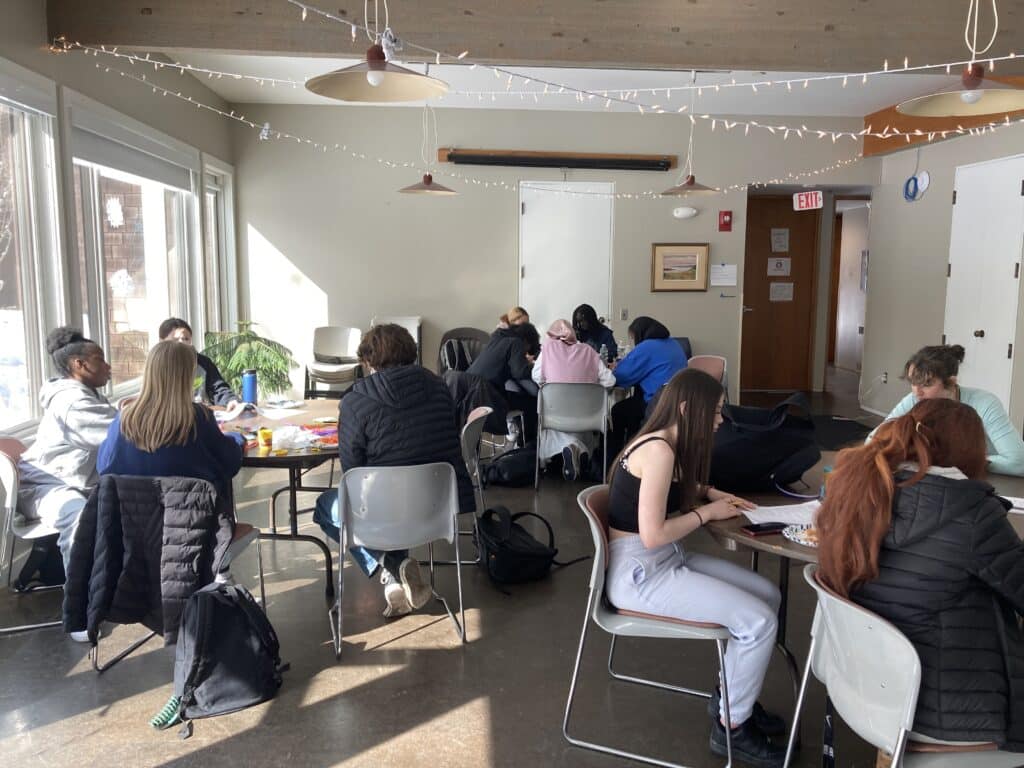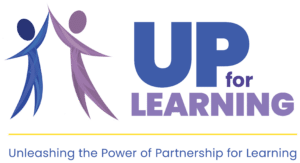 This past April, we told the story of Engage BHS, a pilot program at Burlington High School (BHS) designed to help youth re-engage with their learning community. This program involved BHS, UP for Learning, the Burlington Community Justice Center, and the Howard Center, and included retreats, after-school meetings, as well as independent research conducted by students. This project would not have been possible without the generous funding of the Nellie Mae Foundation. Participating youth earned a half credit towards their graduation requirements, and were financially compensated for their 12 hours of labor outside of school. As the project has wrapped up, we wanted to provide an update on the teams’ final projects, and share some of the feedback that we and our community partners received, as well as our own reflections and visioning as we make plans to run the program next year.
This past April, we told the story of Engage BHS, a pilot program at Burlington High School (BHS) designed to help youth re-engage with their learning community. This program involved BHS, UP for Learning, the Burlington Community Justice Center, and the Howard Center, and included retreats, after-school meetings, as well as independent research conducted by students. This project would not have been possible without the generous funding of the Nellie Mae Foundation. Participating youth earned a half credit towards their graduation requirements, and were financially compensated for their 12 hours of labor outside of school. As the project has wrapped up, we wanted to provide an update on the teams’ final projects, and share some of the feedback that we and our community partners received, as well as our own reflections and visioning as we make plans to run the program next year.
In May, two of the three teams that had formed to focus on specific projects presented their work in a conference room at the Courtyard by Marriott at Burlington Harbor, just down the street from Downtown BHS. In the audience were members of the administration, teachers, BHS students, and community members. The youth did an incredible job walking us through their research, data, and proposals.
The Fun in School group shared the results of surveys that they had administered to youth and adults to solicit ideas for adding more fun and community building to the school day, and described how they planned and advertised for a faculty vs. student basketball game, held at the Hunt Middle School Gymnasium on May 23rd.
The Break Policy group discussed how they had visited Hunt and South Burlington High School to interview administrators about their schools’ break policies, and shared their proposal for a consistent break policy for BHS. They also discussed their plans to meet with Superintendent Tom Flanagan and new BHS Principal, Debra Beaupre, to advocate for its implementation in the coming school year.
Both teams took questions from the audience, impressing all with their thoughtful, honest, and thorough answers. In a conversation after the presentation, one of the youth commented on what she enjoyed about working with her team, stating, “We really used… our learning to our advantage, and it just showed us how much work we actually do…. Like, I can actually do work. I can present it. I can lead. I can go to schools. I can annotate. I can… come up with questions… it was really fun.”

A third team, focused on teacher and student accountability, hosted a focus group of teachers and students and provided recommendations as to how to make community members more accountable to each other when harm has been done. They presented their findings to BHS staff members at a later date.
As with all of our programs, we are eager to hear from the youth about their experiences, good and bad, so that we can improve our design, planning, and facilitation. One of our adult partners at BHS and BCJC, Restorative Practices Specialist Sonya Buglion-Gluck and Youth And Family Liaison Virginia Litchfield, invited several youth to participate in a focus group at the end of the school year. Three youth attended the focus group and two more were interviewed separately. The first question that Virginia posed was, “The goal of this class was to create an inclusive space to reimagine BHS’s approach to school engagement. Do you feel the course addressed this goal? Why or why not?” The answers from the students varied, with some seeing the course as beneficial, and others wishing that the structure and format had been different. One remarked, “I feel like the project helped because I learned how to talk to others, to communicate with other people…both [with] the group and survey. They can’t read your mind, you have to actually say something.” Another remarked, “A little bit… it is hard to have an administrator present because it is frustrating to bring up issues with teachers, and people there defend the teachers.” Many of the students commented on the sense of community that they felt in the course, with one stating, “It was more comfortable because I had friends. Everybody had a friend in the [Engage BHS] course.”
When asked about the top concerns that they feel their school should address, one student said, “Students and teachers should be able to communicate when they are feeling disrespected, [to] speak restoratively to each other,” with another adding, “It is hard to return to class after getting screamed at in the hallway. It makes me need a new break to regulate after the conflict, [and] this increases avoidance and disengagement.”
As we look to revamp the program for next year, we are considering several ideas to make it more impactful for students. The project is contingent upon grant funding at the moment, as it continues to build capacity and become embedded into the sustained structural practices of the school. For next year, we hope to begin the program earlier; this year’s pilot program began in the winter, when the school year was already well underway, and it was challenging to fit the retreats and other meetings into an already-packed schedule. We would also like to embed more access to teachers through previously scheduled professional development time that would be co-facilitated and co-planned by youth participants in the program. As this program becomes more self-sustaining, we have other long term visions, which include implementing the program as part of a study hall course focused on Youth Participatory Action Research (YPAR). This would allow students to conduct their research and analyze data during the school day, rather than during stand-alone retreats or after school. Another larger vision to consider would be to integrate data science into the YPAR process as a way to connect the students’ research to their science courses. This would help to make their classes more meaningful, relevant, and student-centered. Our hope is to share the experiences of the Engage BHS class with the school board, superintendent, and school leadership, including the new principal, over the summer. We would also like to find ways to connect the experiences that students shared with broader issues arising throughout the district, such as racial and ethnic disparities in the discipline data.

We are incredibly grateful for everyone who participated in the Engage BHS program this year, particularly the youth, who so openly and honestly shared their thoughts, experiences, and ideas over the course of the program and during the focus group discussions. We hope to continue this vital work at BHS next year, with many lessons learned, and a clearer understanding of how best to re-engage youth in their learning community.

